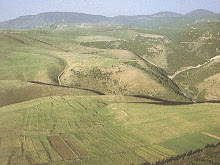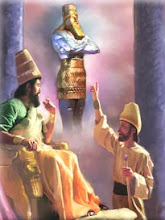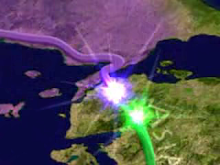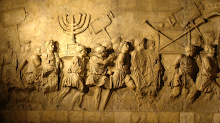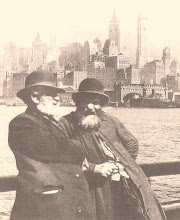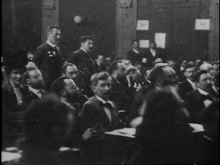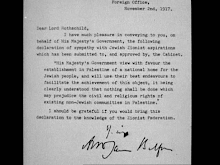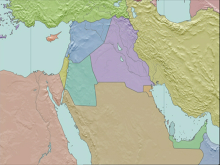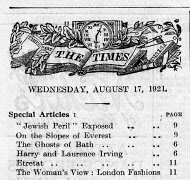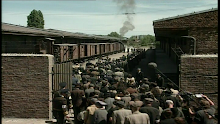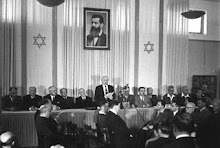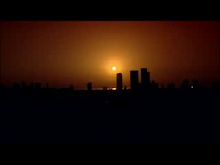THE SIGNPOST YEARS ARE REPRESENTED IN THE NEW PEACE TALKS
After all the photo-calls, back slapping and hype the other week in Washington at the resumption of peace talks between Palestinians and Israelis, today the serious negotiating tasks got under way (September 14th 2010). There are two things in particular that are certain from a ‘Signpost Year’ point of view.
For the first it is inevitable that whatever the outcome in the days or months ahead, with either failure or progress - whatever that means, the upshot will add new uncertainty and potential trepidation to the profound complex circumstances that has become, over the last 100 tortured years, the world’s most entrenched political and religious conundrum. The fact that it has escalate into such, in fact, suggests we would do well to take the possible validity of the Signpost position seriousely.
The second certainty is also sure and clear for all the world to witness, even if ‘they know not what they see.’ It is really quite remarkable that all of the serious and key issues on the negotiating table are focused squarely on events and their outcomes derived directly from the Signpost Years 1902, 1917, 1947-8 and 1967. Those years were indicated in advance up to 200 years ago by Bible scholars examining the prophecy of Daniel in the Old Testament which ancient book itself is two and a half thousand years old.
THE BORDERS ISSUE and EAST JERUSALEM - 1967:
For example, in the 1967 Six Day War, the Israelis took East Jerusalem and regions round about that are now hotly contested in today’s resumed talks. We will all hear in the news over the impending days or months, of demanding calls for a return to the pre - 1967 War borders, as central to the negotiations and conditions for any possible peace. The Jews have, of course, said they will never let east Jerusalem go. The Palestinians want it as part of their new State and capital city. We will hear of '1967' a lot in the coming talks.
THE PALESTINIAN REFUGEE ISSUE - 1947 - 8:
In the throws of decades of strife in the holy Land, the UN in November 1947 voted for a partition of the region into separate Israeli and Palestinian States. Rejecting this, however, some Palestinians began to evacuate the area as fighting and tensions escalated further. But this became a stampede to get out as Israel went ahead with the UN plan for its own National State, and which act ignited the outbreak of the War of Independence, six months after the UN initiative, in 1948. Many thousands of Palestinians were thus made homeless, living ever since in impoverished refugee camps and from where they have endlessly demanded the right of return to former land and homes.
Sitting therefore on the peace-talks table along with the other key issues is this further vexed imperative; the question of the Palestinian refugees and their right of return, a situation that started as a direct consequence of events in 1947-8. This will feature very largely also in the coming talks and media coverage. Simply watch out for it and see.
THE EXISTENCE OF ISRAEL - 1917:
There are many people throughout the middle east and wider world of Islam that do not see the State of Israel as legitimate. Many, such as Hamas, Hezbollah, Al Qaeda and the Talaban, and so on, would like to see Israel’s elimination in fact. The existence of such groups - but their absence from the peace talks - confounds the negotiating position of the Israelis and Palestinians, because of their threats (to both negotiators in fact) and continuing unrepresented middle east concerns that go directly back to the Signpost Year 1917.
In that year the British had promised an independent Arab State in the region if the Arabs would help overthrow the Ottoman Turks in Palestine. That they did. But the British effectively lied and offered a National State to the Jews instead by way of the Balfour Declaration - also in 1917. Further, by helping to expel the Ottomans from the holy Land, those Arabs had been (diabolically for them) recruited into opening the floodgates for returning Jews instead. Between themselves and the French, the British then carved up the whole middle east into geographic boxes irrespective of history, ethnicity or cultures there that were centuries old.
Resentment of all this fuels the ongoing political outrage and religious motivation of terrorist groups down to today, situated outside the current peace talks now taking place, and who’s avowed aim is to see the negotiations fail at any cost - one way or the other. This additional threat to the talks right now, seriously needing resolution, is a consequence of events directly born of 1917.
POLITICAL ZIONISM - 1902:
In 1896 it was proposed by Jewish visionary Theodor Herzl that attempts to end centuries of persecution of Jews world-wide would only conclude with the establishment of a national home and Statehood for the Israeli people. His right hand man, co-architect and biographer of Zionism Max Nordau, tells us that the mandates and plans for this vision came to fruition shortly after, in 1902. Unlike the previous attempt at Aliyah to the holy Land that was failing catastrophically, Herzl's was based on the support of world-wide Jewry, and so on, and would prove to be the approach that wins out historically. With it, however, came an ever escalating confrontation between Palestinians and Jews that has gravitated directly throughout the last century to today’s showdown in the middle east, threatening even global stability.
RELIGIOUS ZIONISM - 1902:
At the exact same moment in time back in 1902, however, the branch of Judaism that came to be termed 'Religious Zionism' was simultaneously born and it too sits crucially on the peace negotiations table-top at the current hour.
The sudden viability of Political Zionism, attained as noted in 1902 according to Nordau, triggered an immediate religious fervor to re-establish ancient biblical Judaism in the holy Land on the newly accomplished back of Herzl's political machinery. The Religious Zionist group named itself 'Mizrachi' under the founder-ship of Rabbi Yitzchak Yaacov Reines who proposed its formation at the fifth World Zionist Organization Congress in late December 1901. The first Mizrachi Conference was then convened shortly after in Vilnius in 1902. Those orthodox Jews believed then, and still do today, that it is only when re-settled in their ancient God given home Land that the religious practices of the Torah (Old Testament) can be fully realized - portending the event of Messiah.
But the Mizrachi of 1902 are still very much around and called such today following an unbroken thread, and are even internationally organized. However, the world only knows these orthodox Jews best from their knitted circular skullcaps and in the current peace talks as ‘the Settlers’ - and not in the context of their 1902 origin (See Wiki under 'Mizrachi - Religious Zionism').
The especially loaded question of the Settlements and their occupants is top of the list to Palestinian negotiators for resolution in the peace talks just re-convened. Further, the Land the Settlers (Mizrachi) have come to occupy they have done so especially since Israel’s Land gains of the Six Day War of 1967. Media attention to this issue of the Settlements is guaranteed in the coming days and beyond - no matter which way the talks deliver in fact.
Again, we see that the firing pistol which starts these central issues off, culminating around the peace negotiating table currently, are all embedded precisely in Clarke and Guinness’ Biblically derived Signpost Years. What should we make of this?
But the year 1902 AD was a double barreled shotgun that simultaneously gave birth to Political Zionism and all its associated problems, and to Religious Zionism also as the Mizrachi-Settlement movement, with both now themselves firmly in a reciprocating firing line.
***********
“The World’s Obsession With The Mideast Conflict” - title in Israel Today.
An interesting observation has been reported in a recent copy of the monthly journal Israel Today (October 2010 page 12). In it Aviel Schneider compares the world’s extreme interest in the nation of Israel concerning its wars and conflicts comparing those occurring elsewhere on the globe. He then draws a remarkable conclusion as to why this may be happening.
“If one were to rate the Israel-Palestinian conflict based on the attention given by the media, it would appear to be the bloodiest dispute on earth. Though dozens of armed conflicts are taking place around the world, they are largely ignored and coverage pales in comparison to the situation in the Middle East.
Of course so-called human rights activists, who are obsessed with Israel, deny that. ‘We criticise other national conflicts just as much,’ said Nobel Prize laureate Mairead Maguire of Northern Ireland, who participated in the ill-fated Gaza flotilla last May (2010).
To test this statement, Israel Today decided to check which global conflicts are receiving the most attention on the Internet. An estimated 1.8 billion people use the Internet, or about 26 percent of the world’s population. A Google search revealed that of the 25 conflicts most widely reported, the ‘conflict in Israel’ led the way with more than 20 million search results; the only phrase with higher results was 25 million for ‘conflict in the Middle East,’ which, of course, also focused on Israel.
In comparison, ‘conflict in Tibet,’ where people are struggling against Chinese rule, showed only 11.5 million results; for ‘conflict in Sudan,’ where Muslims are ethnically cleansing Christians and other opponents with 300,000 dead and 2.7 million driven from their homes, the results were 11.2 million.
What is it about Israel that creates twice the results of searches for Tibet or Sudan? The little Jewish state with its 7.5 million inhabitants (1.5 million of whom are Arabs), in a world of 7 billion, is creating more headlines than any other nation.
Google provides a political and social barometer for the world at large. Far more is written, published, talked and prayed about, cursed, lied and preached about Israel’s conflict than any other. Israel is both hated and loved. Yet the conflict there has inflicted far fewer casualties than the bloodbaths, genocide and massacres happening elsewhere.”
The article totals the number of Jews and Arabs killed in all the major conflicts between the two since the 1948 War of Independence to the Gaza War of 2009. This numbers 82,000 fully. But during the Iran-Iraq conflict alone upwards of 380,000 Iraqis have been estimated to have lost their lives, possibly 500,000 of fellow Muslims in Iran. In fact, “since the establishment of the State of Israel in 1948, more than eleven million Muslims worldwide have lost their lives in wars and conflicts. Of these, 0.6 of a percent or 70,000 were killed in the conflict with Israel. This means that 99.4% of the victims were killed by fellow Muslims and not by Jews.”
A global map shows the top twenty flashpoints that straddle the world as conflicts that are largely ignored, including Nepal, Burma, Somalia, Chad, Peru, Indonesia, Nigeria, Etirea and Dafur, for example. Tens and hundreds of thousands have been killed in these conflagrations. ‘ “These numbers demonstrate that without reason, Israel generates more anger in the world than all other countries”, Messianic Jewish scholar Zvi Sadan told Israel Today…The focus of human rights groups, governments and religious institutions on Israel exposes their hypocrisy because far bloodier conflicts and far greater abuses are occurring elsewhere. But unlike Kosovo and Eritrea, God Himself spoke about Israel in the Bible. And if God is shining His spotlight on Israel to draw attention to His Word, then it all makes sense.”
- October 2010
Introduction
ONE HUNDRED AND FORTY YEARS BEFORE the actual events came to fruition in the Middle East, two dedicated Bible scholars predicted accurately several key years in the then approaching conflict for tenure of the holy Land and Jerusalem, involving a long prophesised regathering of the Jews to their Promised Land, after nearly 2000 years of Diaspora.
Doctors Clarke and Guinness pointed well in advance to the coming years 1902, 1917, 1947-8 and 1967 AD, having based their predictions on the 2,500 year old Biblical book of Daniel.
Not only did their advance forecasts prove accurate decades later, but those key 'Signpost Years’ continue to mark events and developments in the holy Land, ever since their occurrence in modern times, that now represent the specific themes of serious contention in the struggle for Peace in that region today.
These following NOTES explain the rational behind the Clarke-Guinness thinking in as fast and concise a form as possible, and elaborations will follow. A second critical aim here is not to prove 'The Signpost Years' correct, but rather to use the scientific approach of attempting their falsification first. You can help either way by passing on any objective comments to this site.
PART 1 Is an Introduction and looks at each of the Signpost Years as they were foretold in the writings of Guinness and Clarke. It looks at many of the side issues and has a number of detailed footnotes.
PART 2 Looks at the period 1901 – 1903, and the first of the Signpost Years predicted by Clarke in 1825. This part explains the huge significance of the period and sets the scene for a further link that comes in Part 4.
PART 3 Begins to address some of the typical questions that might arise in the mind of the reader regarding the Signpost Years. Items are added to this from time to time as new considerations are brought to light. Again, feel free to contribute any comments that will add to those pages.
PART 4 Looks at the Signpost Years in the light of the last 6 months of Christ’s Ministry, and especially the last week of messages He imparted to His followers for the future. It ties directly back into PART 2.
*****************************************************
TO READ SPECIFIC 'CHAPTERS' CLICK ONE OF THE 'QUICK LINKS' LISTED DIRECTLY BELOW, AND TO READ OR ADD COMMENTS, CLICK 'POST COMMENT' AT THE END OF EACH CHAPTER THAT WILL OPEN AN EMAIL BOX TO SEND TO THIS BLOG.
AGAIN YOU CAN SIMPLY EMAIL TO:
karl@thesignpostyears.com
Click on QUICK LINKS to Parts 1 to 4 of the Signpost Notes:
Part 1: Introduction, Timelines, Conclusion.
Part 2: The SignPost Year 1902 AD and Max Nordau
Part 3: Q & A on the Signpost Years
Part 4: Jesus and the Signpost Years
Doctors Clarke and Guinness pointed well in advance to the coming years 1902, 1917, 1947-8 and 1967 AD, having based their predictions on the 2,500 year old Biblical book of Daniel.
Not only did their advance forecasts prove accurate decades later, but those key 'Signpost Years’ continue to mark events and developments in the holy Land, ever since their occurrence in modern times, that now represent the specific themes of serious contention in the struggle for Peace in that region today.
These following NOTES explain the rational behind the Clarke-Guinness thinking in as fast and concise a form as possible, and elaborations will follow. A second critical aim here is not to prove 'The Signpost Years' correct, but rather to use the scientific approach of attempting their falsification first. You can help either way by passing on any objective comments to this site.
PART 1 Is an Introduction and looks at each of the Signpost Years as they were foretold in the writings of Guinness and Clarke. It looks at many of the side issues and has a number of detailed footnotes.
PART 2 Looks at the period 1901 – 1903, and the first of the Signpost Years predicted by Clarke in 1825. This part explains the huge significance of the period and sets the scene for a further link that comes in Part 4.
PART 3 Begins to address some of the typical questions that might arise in the mind of the reader regarding the Signpost Years. Items are added to this from time to time as new considerations are brought to light. Again, feel free to contribute any comments that will add to those pages.
PART 4 Looks at the Signpost Years in the light of the last 6 months of Christ’s Ministry, and especially the last week of messages He imparted to His followers for the future. It ties directly back into PART 2.
*****************************************************
TO READ SPECIFIC 'CHAPTERS' CLICK ONE OF THE 'QUICK LINKS' LISTED DIRECTLY BELOW, AND TO READ OR ADD COMMENTS, CLICK 'POST COMMENT' AT THE END OF EACH CHAPTER THAT WILL OPEN AN EMAIL BOX TO SEND TO THIS BLOG.
AGAIN YOU CAN SIMPLY EMAIL TO:
karl@thesignpostyears.com
Click on QUICK LINKS to Parts 1 to 4 of the Signpost Notes:
Part 1: Introduction, Timelines, Conclusion.
Part 2: The SignPost Year 1902 AD and Max Nordau
Part 3: Q & A on the Signpost Years
Part 4: Jesus and the Signpost Years
Tuesday, 14 September 2010
Subscribe to:
Comments (Atom)
The SignPost Years
Click on QUICK LINKS 1 to 3 here for Signpost Year Notes:
Part 1: Introduction, Timelines, Conclusion.
Part 2: The SignPost Year 1902 AD and Max Nordau
Part 3: Q & A on the Signpost Years
Part 4: Jesus and the Signpost Years
Part 1: Introduction, Timelines, Conclusion.
Part 2: The SignPost Year 1902 AD and Max Nordau
Part 3: Q & A on the Signpost Years
Part 4: Jesus and the Signpost Years
